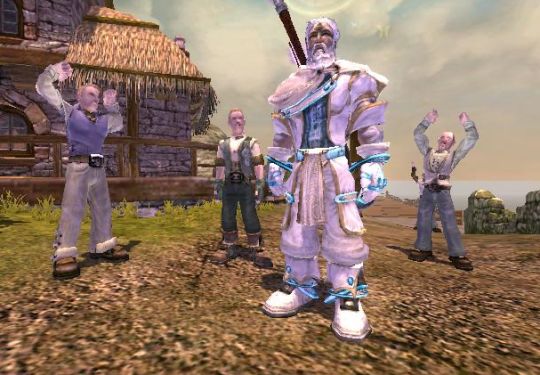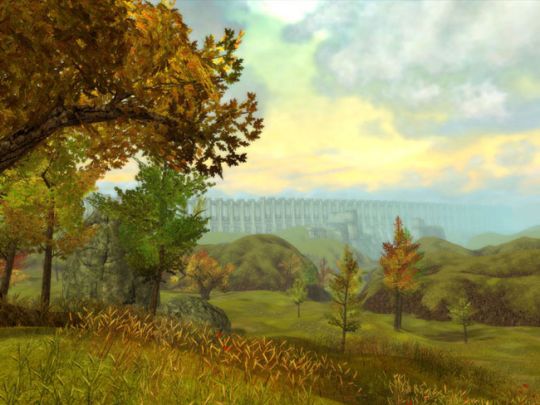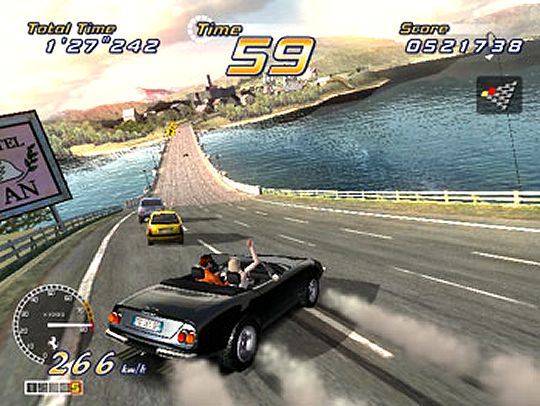|
THE CAMPAIGN FOR MORE ACRONYMS
Videogames: not enough jargon.
Okay, so it's all too easy to slag off videogames magazines. (And hey, whoever said that just because something was easy, it was inherently wrong, eh?) We all know that they're in the pockets of advertisers. We all know that half the time they haven't bothered to play the games they "review". We all know that even the honest reviews are largely worthless because they're nearly always given to people pre-disposed to like the game. But if we're so smart, what would WE do that'd be any different? Got any constructive ideas, have we?
Well, of course we do. But first, since the prevailing trend in current online videogaming journalism is apparently to ramble on and on and on for several thousand words before you get to the point, some background. (This approach, you'll be excited to hear, ties in with the subject of the article in a fantastically clever and modern way. Later on.)

Some shit videogame magazines in dire need of improving, earlier today.
Today (which is Tuesday, if you're keeping count), your reporter was chatting to some of his game-journo pals about game stuff, like you do. Specifically, in this case, about Fable, the latest in Peter Molyneux's growing series of games exploring the consequences of morality and that. Your reporter had recently gotten hold of the Xbox version, and was bored. Discussing the matter with one colleague - a fan of the game - your correspondent wearily observed, not for the first time, the gruelling amount of "tutorial" and story exposition the modern gamer is expected to plough through before getting anywhere near anything that could sensibly be described as "gameplay".
"Ah," said the colleague, "but that depends on whether you're playing in multiplayer."
"It does?", queried your semi-intrigued reporter.
"Yes, you fat idiot. Take something like Guild Wars as an example. If I clicked the right window, I'd be in the Player-vs-player world online and fighting in tournaments within seconds. Whereas if I clicked the left window, 16 hours later I'm still probably in something you'd class as a training sequence."
"I see. Although since Fable doesn't have multiplayer, I fail to see the relevance in the context of this discussion. Stupidface."
"You get the general point, though."
And grudgingly, your correspondent was forced to admit that he did. (Much later, when the discussion had ended and the colleague had gone away.) But the debate raised a point related to the one we're really going to be talking about in this feature, and it's worth taking a brief moment out to look at it.

Fable: boring.
Y'see, in this reviewer's eyes, online multiplayer games aren't, in any traditional sense of the word, "games" at all. At least, not the sort of games that should be mentioned in the same context as videogames, as opposed to the likes of Dungeons And Dragons. Few things are more tiresome than the morons who write into games magazines bemoaning that the 61% review received by some awful elf-strewn RPG or mediocre World War 2 FPS failed to take account of the game's online multiplayer functions, and the reason for this is that nearly everything that makes a videogame a videogame in the conventional sense goes out of the window as soon as you put it online. Clever AI? Well-judged difficulty curve? Balanced risk-versus-reward structure? Absence of 14-year-old morons spKNg lk THs!!!? All gone. Online it's just you and a big bunch of other nerds, nerding it around in Nerdland.
With the exception of racing or sports games (and for the purposes of this argument, something like Unreal Championship is a "sport"), where real people simply take the place of CPU opposition or team-mates, online games are a fundamentally different beast to their home counterparts. Rather than setting linear goals and challenges, they simply put the players in an environment with some basic rules, then let them get on with doing whatever the heck they feel like. They're not games - they're a second, virtual, life, for people who aren't content with reality as it stands in its difficult, elf-free state. People who'd regard being, say, a shoemaker as a grossly tedious occupation in real life, but will happily spend hours and hours making pretend shoes in some gruesome Tolkienesque fantasy world and paying a fat monthly fee for the privilege. (With the ultimate goal, of course, of buying a great big pretend sword and slaying a big pretend dragon-type monster with it - rather than, say, just buying a game where you have a big sword from the start and can get straight on with the monster-slaying without making any shoes at all.)
In a world where existing genre names are increasingly inadequate (what sort of game is Grand Theft Auto: San Andreas, for example?), we need a new name for these types of game, replacing the meaningless term "RPG". (Because after all, you play a role in every game, don't you?) World Of Stuart humbly suggests "GOS", or "Going Outside Simulator". But alert readers will recall that that wasn't the original point of this feature. More relevantly, and springing from the same discussion, there's another new three-letter acronym that your correspondent would like to see introduced into the world of gaming too.

Guild Wars: a really long training section, apparently.
Because, shaking off our colleague's cunning attempt at a diversionary tactic, we still haven't addressed the epidemic of modern games taking hours and hours of instruction and exposition before they deliver any actual game. Fable is a particularly bad case - not only do you have to go through hours of gruelling and essentially pointless "training" (one lengthy sequence teaches you, for example, that you press the "Y" button to block), but if you try to save the game after an especially dull bit makes you lose the will to continue, the bastard thing will actually put you back about half an hour's play when you next load it up. Jesus.
Luckily, however, your ever-pioneering reporter has a solution to this problem, and it's one which solves another problem too - namely Official Xbox Magazine Syndrome, or the unfortunate situation whereby a magazine writes a review of a game without actually playing it. It's a simple innovation, yet one which in two words could pass on as much useful information as a thousand words of a typical 2005 games-magazine review, and what's more would go a long way to clearing up a great many hotly-disputed arguments about the merits of particular titles. The innovation is this: the PGB Factor.

Out Run 2: PGB Factor - three seconds.
The PGB Factor is a simple rating that would be attached to every review alongside the scores for Graphics, Sound, Lifespan and all the rest of them. Measured as a unit of time, it'd tell readers just how long they had to endure the game's various tutorials, training levels, plot expositions, FMV intros and whatever else, until they'll get to the bit where it actually starts to become fun. In other words, how much Pre-Game Bullshit there was.
So for example, a game like Final Fantasy VII, which even by the accounts of its biggest fans starts with an appallingly dull section long enough to put off a great many would-be players, would have a PGB Factor of six hours (since apparently that's when the good stuff kicks in). Gran Turismo 4's PGB Factor would be about two hours - the amount of time it takes you to pass some licence tests and actually be allowed to participate in the proper racing. Halo, where the tutorial is cleverly worked in to the story and doesn't drag on forever, would have a PGB Factor of about 10 minutes, and obviously Wario Ware's would be five seconds flat. You see how it works.
The advantages of the PGB Factor are many, and it's good for everyone. It's good for game publishers, because if they've stupidly released a game with a big PGB Factor, at least people will know how much they have to suffer, and with an end in sight might stick with the game rather than taking it back to the shop to swap for something else. It's good for players for the same reason, and also because they know when to avoid wasting money on a game whose PGB Factor will exceed their attention span. It's good for Official Xbox Magazine readers, because in order to have identified the PGB Factor, they know the reviewer has to have actually played the game at least a bit. And it's good for reviewers too, because they might just win back a fraction of their treacherous souls.
Viewers! Demand the PGB Factor!
|

